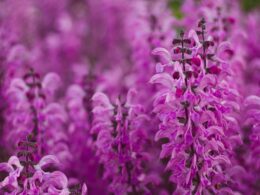Are you looking for a way to keep your perennial plants healthy and thriving? Look no further than compost!
Compost is a nutrient-rich soil amendment that can provide the essential nutrients that perennials need to grow strong and vibrant. But with so many types of compost available, it can be difficult to know which one is best for your plants.
In this article, you’ll learn about the different types of compost that are suitable for perennials, as well as tips for using compost effectively and common mistakes to avoid.
By the end of this article, you’ll have a better understanding of how compost can help you maintain healthy and beautiful perennial plants, and which compost is best suited for your garden.
So let’s dive in and discover the benefits of compost for your perennials!
Understanding the Needs of Perennial Plants
You’ll want to pay attention to what your perennial plants need to thrive, so they can keep coming back year after year and fill your garden with beauty.
Perennial plants have specific nutrient requirements and watering habits that you should be aware of. For example, some perennials prefer more acidic soil, while others thrive in alkaline soil. You can test your soil to determine its pH level and adjust it accordingly.
When it comes to watering perennials, it’s important to strike a balance between over and under watering. Some perennials, like sedums, prefer drier soil, while others, like hostas, need consistent moisture. Always check the soil moisture level before watering to avoid drowning your plants. You can also consider adding a layer of mulch to retain moisture and prevent weeds.
In order to ensure your perennial plants thrive, take the time to understand their specific nutrient requirements and watering habits. By doing so, you’ll be able to create the ideal environment for your plants to grow and flourish.
Remember to test your soil, adjust pH levels as needed, and water your plants according to their individual needs.
Types of Compost Suitable for Perennials
When planting perennials, you’ll want to consider using specific types of organic matter to ensure healthy growth. Compost is a great option for providing the necessary nutrients and improving soil structure.
There are various composting methods you can use, including traditional backyard composting, vermicomposting, and compost tea brewing. Traditional backyard composting involves combining green and brown materials such as grass clippings, leaves, and food scraps. Vermicomposting uses worms to break down organic matter, while compost tea brewing involves steeping compost in water and then using the liquid to fertilize plants.
Regardless of which method you choose, it’s important to use high-quality organic matter sources such as vegetable and fruit scraps, coffee grounds, and yard waste. Using compost can benefit perennial plants in many ways. It can improve soil structure, increase water retention, provide essential nutrients, and promote healthy root growth.
By incorporating compost into your perennial garden, you can create a thriving ecosystem that supports the growth of your plants and helps them to thrive. So, when planning your perennial garden, be sure to consider the benefits of compost and choose the method that works best for you.
Why is Compost Beneficial for Perennials?
Compost is highly beneficial for perennials and compost. It enriches the soil by providing essential nutrients and improves its structure, promoting healthy root development. The organic matter in compost retains moisture and prevents soil erosion, creating an ideal environment for perennials to thrive all year round. Additionally, compost acts as a natural fertilizer, reducing the need for chemical alternatives and maintaining a sustainable garden ecosystem.
Tips for Using Compost Effectively
When using compost in your garden, there are three key tips to keep in mind. First, make sure to mix the compost thoroughly with your soil to ensure that your plants receive the necessary nutrients.
Second, apply the compost directly to the plants for maximum effect.
Finally, consider using compost as a mulch to retain moisture and suppress weeds. By following these tips, you can ensure that your compost is used effectively and efficiently in your garden.
Mixing Compost with Soil
Mixing in some of this nutrient-rich soil will give your perennials a boost and help them thrive for years to come.
When it comes to mixing compost with soil, it’s important to remember that too much can be harmful to your plants. A good rule of thumb is to mix in about 1-2 inches of compost for every 6-8 inches of soil. This will provide your perennials with the necessary nutrients without overwhelming them.
To mix your compost and soil, start by digging a hole in your garden bed and filling it with a layer of compost. Then, add a layer of soil on top and mix the two together with a garden fork or shovel. Continue this process until you have mixed in the desired amount of compost.
Remember to water your plants thoroughly after mixing in compost to help the nutrients reach the roots.
By mixing compost with soil, you’ll be providing your perennials with the nutrients they need to thrive and grow strong.
Applying Compost to Plants
Boost your plant’s growth and health by applying compost in a way that ensures long-term success. Composting techniques can greatly benefit your perennials by providing essential nutrients, improving soil structure, and increasing water retention.
When applying compost, make sure to spread a layer of about 1-2 inches deep around the base of your plants. Avoid piling compost directly on top of your perennials as this can lead to root rot or disease.
Composting benefits not only your plants but also the environment by reducing waste and improving soil health. By adding compost to your garden, you’re creating a sustainable and healthy ecosystem for your perennials to thrive in.
Remember to keep adding compost regularly to ensure continued growth and success for your plants. With proper composting techniques and application, your perennials will be stronger, healthier, and more beautiful than ever before.
Mulching with Compost
If you want your garden to look its best, try mulching with compost – it’s an easy way to nourish your plants and keep them happy!
Using compost as mulch has many benefits, including improving soil quality, retaining moisture, suppressing weeds, and providing nutrients to your perennials.
To start, make sure to apply a layer of compost about two to three inches thick around the base of your plants. This will help to retain moisture in the soil, which is especially important during hot and dry weather. Additionally, the compost will help to suppress weeds, making it easier to maintain your garden.
Composting techniques for beginners can be as simple as starting a small compost bin or using compostable materials like leaves and grass clippings to create your own compost.
By using compost as mulch, you’ll be providing your perennials with the nutrients they need to thrive, while also improving the overall health of your garden.
Common Mistakes to Avoid
You might be tempted to take shortcuts when it comes to using compost for your perennials, but avoiding common mistakes will help your garden thrive.
One mistake is not properly composting your materials before adding them to your garden. Composting techniques involve allowing organic matter to break down and decompose, creating nutrient-rich soil. Adding fresh materials to your garden can actually deplete your soil of nutrients, making it more difficult for your perennials to grow.
Another mistake is not properly incorporating the compost into the soil. Simply layering compost on top of the soil can create a barrier that prevents water and nutrients from reaching the roots of your perennials. To avoid this, mix the compost into the soil thoroughly, allowing for better absorption and distribution of nutrients.
A common misconception is that more compost is better. While compost can be incredibly beneficial for your perennials, adding too much can actually harm them. Too much compost can create an imbalance of nutrients and alter the pH level of your soil, making it difficult for your perennials to thrive.
Be sure to use compost in moderation and monitor the health of your plants to ensure they are receiving the proper amount of nutrients.
How Can I Use Compost to Enrich my Perennial Garden in Indiana?
Using compost is a great way to nourish your lush perennials for Indiana gardening. Simply spread a layer of compost around the base of your plants to provide essential nutrients and improve soil structure. This will help your perennial garden thrive and bloom beautifully throughout the seasons.
Maintaining Healthy Perennial Plants with Compost
Maintaining healthy and thriving perennial plants is made easy with the help of nutrient-rich soil created through proper decomposition techniques. Organic compost is one of the best sources of nutrients for perennials. It enhances the soil’s fertility, improves drainage, and increases microbial activity.
Here are some benefits of using organic compost:
- Provides a slow release of nutrients that perennials need to grow and thrive.
- Increases the soil’s water retention capacity, which helps the plants to stay hydrated during dry spells.
- Enhances soil structure and texture, which improves root growth and prevents soil compaction.
Composting for sustainable gardening is an excellent way to create organic compost for your perennials. It’s an eco-friendly way of disposing of organic waste, and it reduces landfill space. You can compost kitchen waste, yard waste, and animal manure to create nutrient-rich soil for your perennials.
Here are some tips for composting:
- Use a compost bin or container to prevent animals from getting into the compost pile.
- Maintain a balance of green and brown materials to speed up decomposition.
- Turn the compost pile regularly to aerate it and ensure that it decomposes evenly.
Incorporating organic compost into your perennial garden is an excellent way to maintain healthy and thriving plants. It’s a sustainable and eco-friendly way to provide the nutrients your plants need to grow. Composting is an easy and inexpensive way to create nutrient-rich soil for your garden. By composting at home, you can reduce your carbon footprint and contribute to a healthier environment.
Frequently Asked Questions
How often should I apply compost to my perennial plants?
To keep your perennial plants healthy, it’s important to apply compost regularly. The frequency of composting depends on the specific needs of your plants, but a good rule of thumb is to apply a layer of compost once or twice a year.
Compost is a great source of nutrients for your plants, and it also improves soil structure and water retention. If you want to take your composting to the next level, consider making compost tea.
Compost tea is a liquid fertilizer made by steeping compost in water. It’s a great way to provide your plants with a concentrated dose of nutrients and beneficial microorganisms. Applying compost tea once a month can help keep your perennial plants thriving.
With regular composting and compost tea applications, your perennials will be strong, healthy, and beautiful for years to come.
Can I use homemade compost for my perennials or do I need to buy commercial compost?
You might be wondering if you can use DIY compost for your perennials instead of buying commercial compost. The answer is yes, you can! In fact, homemade compost is often better for your plants as it contains more diverse nutrients and microorganisms that are essential for their growth and health.
Plus, making your own compost is a great way to reduce waste and save money. Just make sure to properly balance the ingredients in your compost pile and allow it to fully decompose before using it on your perennials.
With homemade compost, your plants will thrive and you can feel good about reducing your environmental impact.
Are there any perennials that do not benefit from compost?
When it comes to compost for perennials, it’s natural to wonder if there are any exceptions. After all, not all plants have the same needs. However, the truth is that all perennials can benefit from compost.
It’s a great way to improve soil structure, add nutrients, and increase water-holding capacity. The timing of compost application is also important. For best results, add compost in the spring or fall, when plants are actively growing.
Doing so will help them establish strong root systems and thrive throughout the season. Whether you’re growing flowers, herbs, or vegetables, compost is a safe and effective way to support healthy growth.
Is it safe to use compost made from animal manure on my perennials?
Using compost as a fertilizer for your perennials has many benefits, including improved soil structure and increased nutrient availability. However, if you’re concerned about using compost made from animal manure, there are alternative options.
You can try using compost made from plant materials such as leaves, grass clippings, and kitchen scraps, or purchase commercial composts that don’t use animal manure.
While compost made from animal manure can be safe for use in your garden, it’s important to ensure that the compost is fully matured and has reached a high enough temperature to kill any pathogens that may be harmful to your plants.
By taking these precautions, you can safely use compost to give your perennials the nutrients they need to thrive.
Can I use too much compost on my perennial plants?
Using too much compost on your perennial plants can have both pros and cons. On one hand, compost can provide essential nutrients that promote healthy growth and blooming. However, overuse can also lead to negative effects on growth, such as root rot and nutrient burn.
It’s important to find a balance and use compost in moderation, making sure to monitor your plants for any signs of stress or damage. While compost can be a great resource for your perennials, it’s crucial to use it responsibly and in appropriate amounts to avoid any potential harm.
Conclusion
So, you now know that perennials have different needs than annuals when it comes to compost. To ensure that your perennials thrive, use compost that’s rich in nutrients and organic matter.
Avoid using compost that’s too high in nitrogen or too acidic, as this can harm your plants. Remember to mix your compost with other soil amendments and to apply it in the right amount and at the right time.
Don’t make the common mistake of over-applying or applying too late in the season. With these tips and some careful planning, you can maintain healthy and beautiful perennial plants with the help of compost.
Happy gardening!








